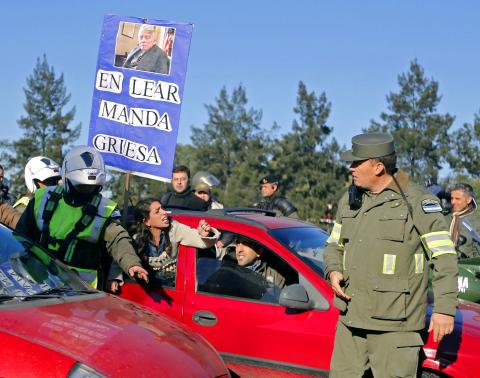The US judge presiding over Argentina’s debt dispute with two US hedge funds threatened on Friday to hold the country in contempt of court for “false and misleading” statements.
The warning came after Argentina accused US District Judge Thomas Griesa of overstepping his jurisdiction by blocking the country from servicing its restructured debt until it settles its US$1.3 billion dispute with the hedge funds.
The Argentine government made that argument in two-page advertisements on Thursday in the New York Times and the Wall Street Journal after Griesa’s ruling forced it into default for the second time in 13 years.

Photo: Reuters
Griesa condemned the ads, which were called “legal notices” and urged creditors to replace the bank the judge has barred from disbursing their interest payments, Bank of New York Mellon, where an overdue US$539 million Argentine payment is currently frozen.
The messy court battle stems from the South American country’s 2001 economic crisis, when it defaulted on more than US$100 billion in debt.
It persuaded most of its creditors to accept a 70 percent write-down in deals reached in 2005 and 2010.
However, plaintiffs NML Capital Ltd and Aurelius Capital Management, which bought up Argentine debt very cheaply when it was in default, refused to sign the restructuring plan and took the country to court.
Argentina has condemned its opponents as “vulture funds,” dismissed Griesa as “incompetent” and biased, and called on the US government to intervene.
On Thursday, Argentina sought to haul the US before the International Court of Justice (ICJ) over the dispute. The Hague-based court said Argentina was suing the US for violating its sovereignty.
However, the court would only hear the case if Washington accepted its jurisdiction, something the US State Department ruled out on Friday.
Argentina says yielding to the hedge funds could expose it to more than US$100 billion in claims for equal treatment from the 92 percent of creditors who had agreed to a write-down.
International banks including Deutsche Bank AG, Citigroup Inc, JPMorgan Chase & Co and HSBC are reportedly in talks with the hedge funds to resolve the impasse by buying up their bonds so Argentina can exit its default.
“The talks are very fluid,” a source close to the negotiations told reporters on Friday. “It is changing quickly every day.”
The impact of Argentina’s default has so far been much smaller than in 2001, as the country has been isolated from international capital markets ever since. However, analysts say a drawn-out dispute would do further damage to Argentina’s recession-hit economy.

Nvidia Corp chief executive officer Jensen Huang (黃仁勳) on Monday introduced the company’s latest supercomputer platform, featuring six new chips made by Taiwan Semiconductor Manufacturing Co (TSMC, 台積電), saying that it is now “in full production.” “If Vera Rubin is going to be in time for this year, it must be in production by now, and so, today I can tell you that Vera Rubin is in full production,” Huang said during his keynote speech at CES in Las Vegas. The rollout of six concurrent chips for Vera Rubin — the company’s next-generation artificial intelligence (AI) computing platform — marks a strategic

REVENUE PERFORMANCE: Cloud and network products, and electronic components saw strong increases, while smart consumer electronics and computing products fell Hon Hai Precision Industry Co (鴻海精密) yesterday posted 26.51 percent quarterly growth in revenue for last quarter to NT$2.6 trillion (US$82.44 billion), the strongest on record for the period and above expectations, but the company forecast a slight revenue dip this quarter due to seasonal factors. On an annual basis, revenue last quarter grew 22.07 percent, the company said. Analysts on average estimated about NT$2.4 trillion increase. Hon Hai, which assembles servers for Nvidia Corp and iPhones for Apple Inc, is expanding its capacity in the US, adding artificial intelligence (AI) server production in Wisconsin and Texas, where it operates established campuses. This

US President Donald Trump on Friday blocked US photonics firm HieFo Corp’s US$3 million acquisition of assets in New Jersey-based aerospace and defense specialist Emcore Corp, citing national security and China-related concerns. In an order released by the White House, Trump said HieFo was “controlled by a citizen of the People’s Republic of China” and that its 2024 acquisition of Emcore’s businesses led the US president to believe that it might “take action that threatens to impair the national security of the United States.” The order did not name the person or detail Trump’s concerns. “The Transaction is hereby prohibited,”

Garment maker Makalot Industrial Co (聚陽) yesterday reported lower-than-expected fourth-quarter revenue of NT$7.93 billion (US$251.44 million), down 9.48 percent from NT$8.76 billion a year earlier. On a quarterly basis, revenue fell 10.83 percent from NT$8.89 billion, company data showed. The figure was also lower than market expectations of NT$8.05 billion, according to data compiled by Yuanta Securities Investment and Consulting Co (元大投顧), which had projected NT$8.22 billion. Makalot’s revenue this quarter would likely increase by a mid-teens percentage as the industry is entering its high season, Yuanta said. Overall, Makalot’s revenue last year totaled NT$34.43 billion, down 3.08 percent from its record NT$35.52